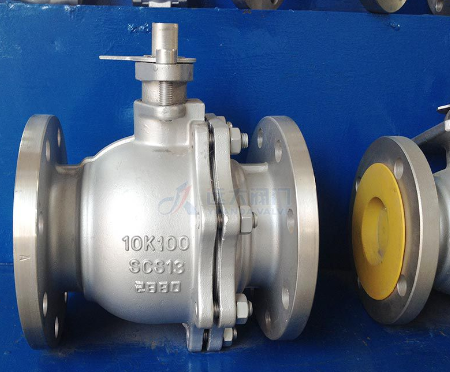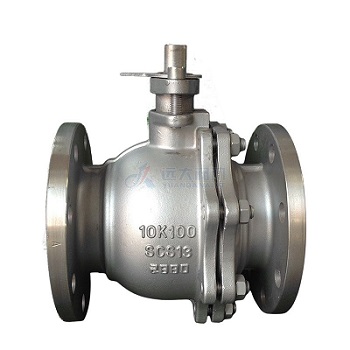Classification And Working Principle Of Stainless Steel Ball Valve
The ball valve is a new type of valve that has been widely used in recent years. This article mainly discusses the categories and working principles of stainless steel ball valves.
Ball valves are classified according to the structural form
1. Fixed ball valve
The ball of the ball valve is fixed and does not move after being pressed. The fixed ball valve is equipped with a floating valve seat. After the pressure of the medium, the valve seat moves, so that the sealing ring is pressed tightly on the ball to ensure sealing. Bearings are usually installed on the upper and lower shafts of the sphere, and the operating torque is small, which is suitable for high-pressure and large-diameter valves. In order to reduce the operating torque of the ball valve and increase the reliability of the seal, oil-sealed ball valves have appeared in recent years. Special lubricants are injected between the sealing surfaces to form an oil film, which enhances the sealing performance and reduces the operating torque. , It is more suitable for high-pressure and large-caliber ball valves.
2. Elastic ball valve
The ball of the ball valve is elastic. Both the ball and the valve seat sealing ring are made of metal materials, and the sealing specific pressure is very large. The pressure of the medium itself cannot meet the sealing requirements, and external force must be applied. This valve is suitable for high-temperature and high-pressure media. The elastic sphere is made by opening an elastic groove on the lower end of the inner wall of the sphere to obtain elasticity. When closing the passage, use the wedge-shaped head of the valve stem to expand the ball and press the valve seat to seal.
Loosen the wedge-shaped head before rotating the sphere, and the sphere will return to its original shape so that there is a small gap between the sphere and the valve seat, which can reduce the friction of the sealing surface and the operating torque. The three-way ball valve has T type and L type. The T type can connect three orthogonal pipelines with each other and cut off the third channel, which can split and merge. The L-shape can only connect two orthogonal pipes, and cannot maintain the third pipe to communicate with each other at the same time. It only plays a role in distribution.

3. Floating ball valve
The ball of the ball valve is floating. Under the action of the medium pressure, the ball can produce a certain displacement and press tightly on the sealing surface of the outlet end to ensure the seal of the outlet end. The floating ball valve has a simple structure and good sealing performance, but the load of the sphere bearing the working medium is all transmitted to the outlet sealing ring, so it is necessary to consider whether the sealing ring material can withstand the working load of the sphere medium. This structure is widely used in medium and low-pressure ball valves.
The working principle of the ball valve
The working principle of the ball valve is to make the valve unblocked or blocked by rotating the valve. The ball valve switch is light, small in size, can be made into a large diameter, reliable in sealing, simple in structure, easy to maintain, the sealing surface and the spherical surface are often in a closed state, and it is not easy to be eroded by the medium. It is widely used in various industries.
The ball valve and the plug valve are the same types of valve. Only its closing part is a ball. The ball rotates around the centerline of the valve body to achieve opening and closing.
The ball valve is mainly used to cut off, distribute and change the flow direction of the medium in the pipeline. The ball valve is a new type of valve that has been widely used in recent years.
We are a stainless steel ball valve supplier, please feel free to contact us if you need them.
